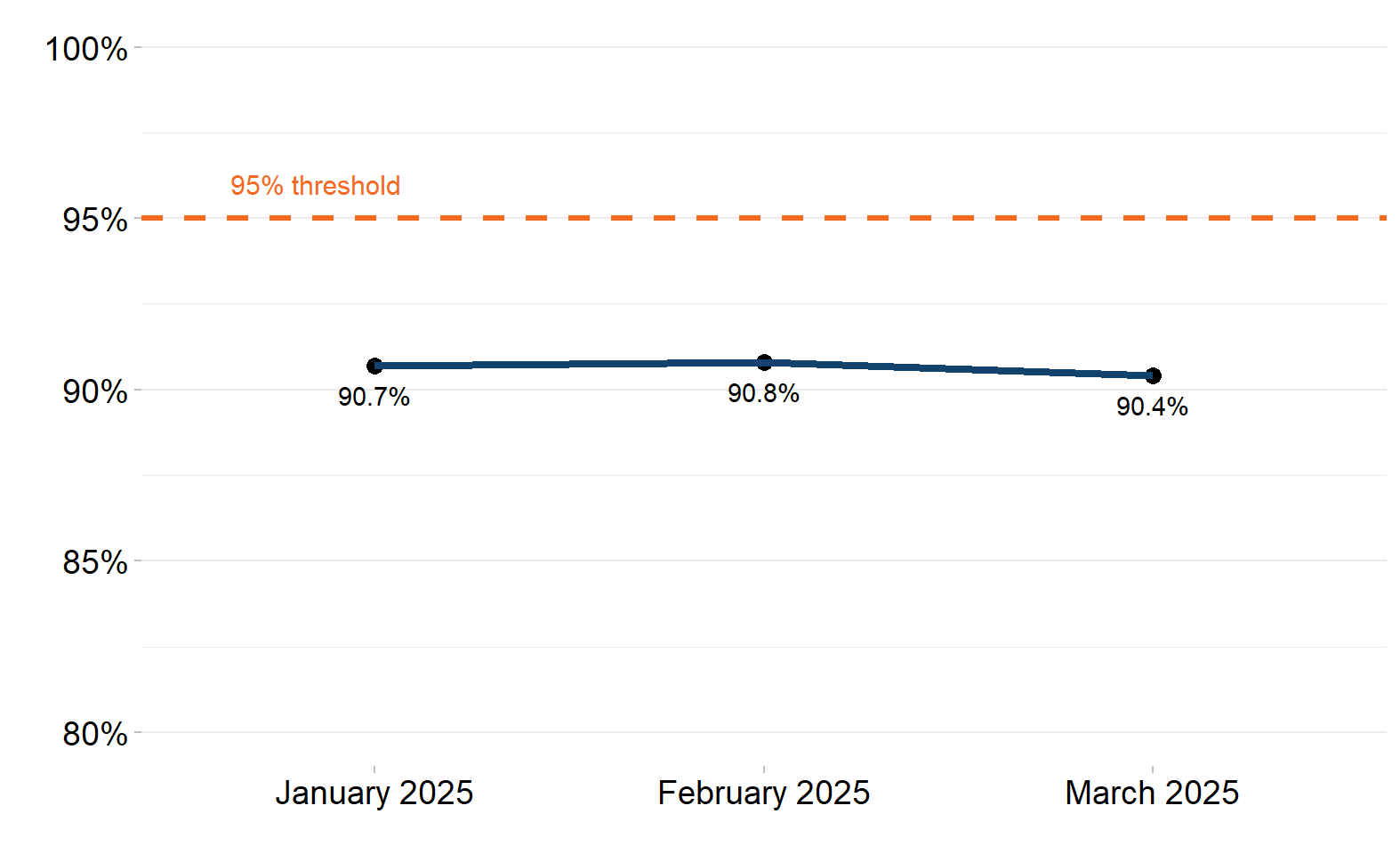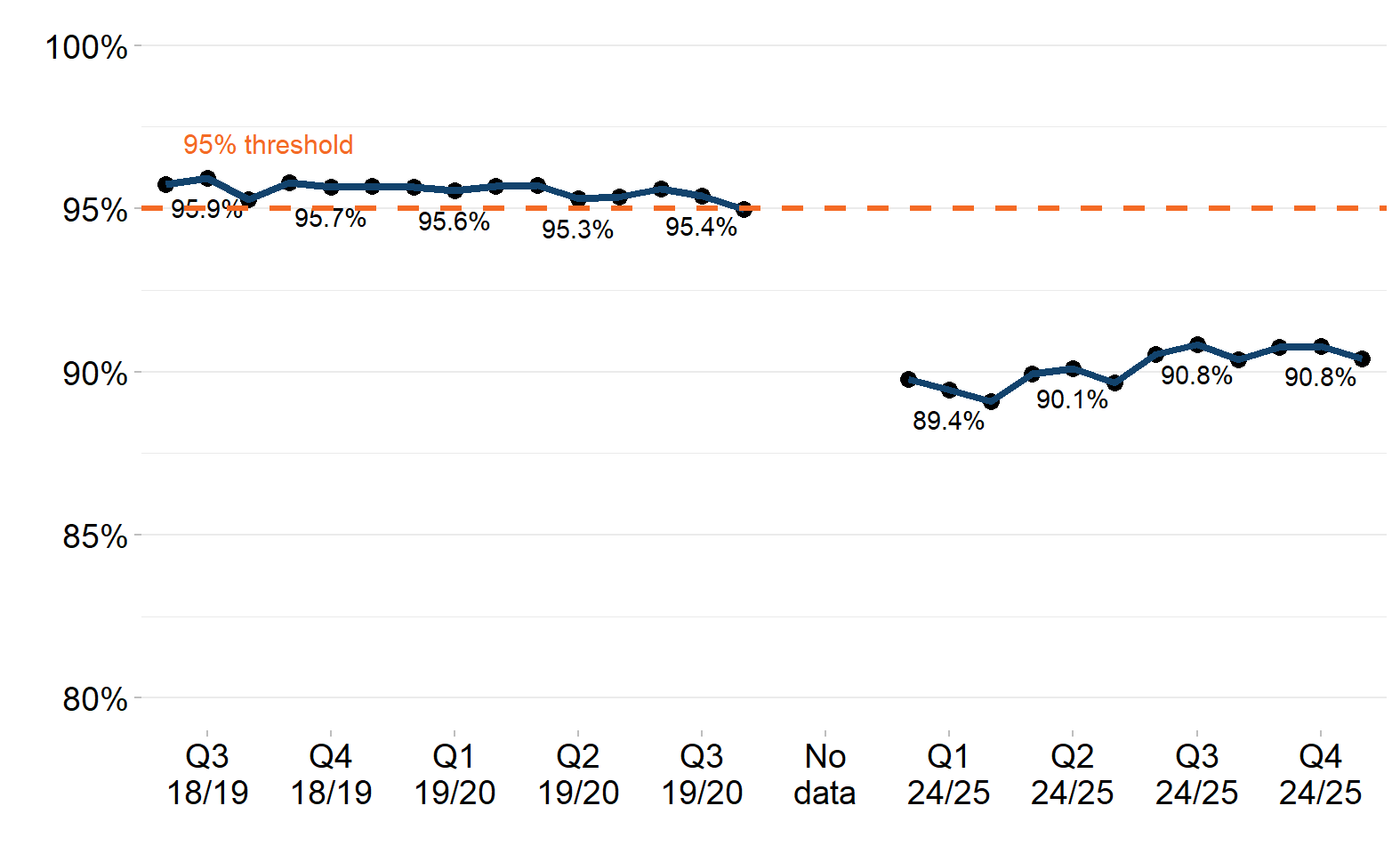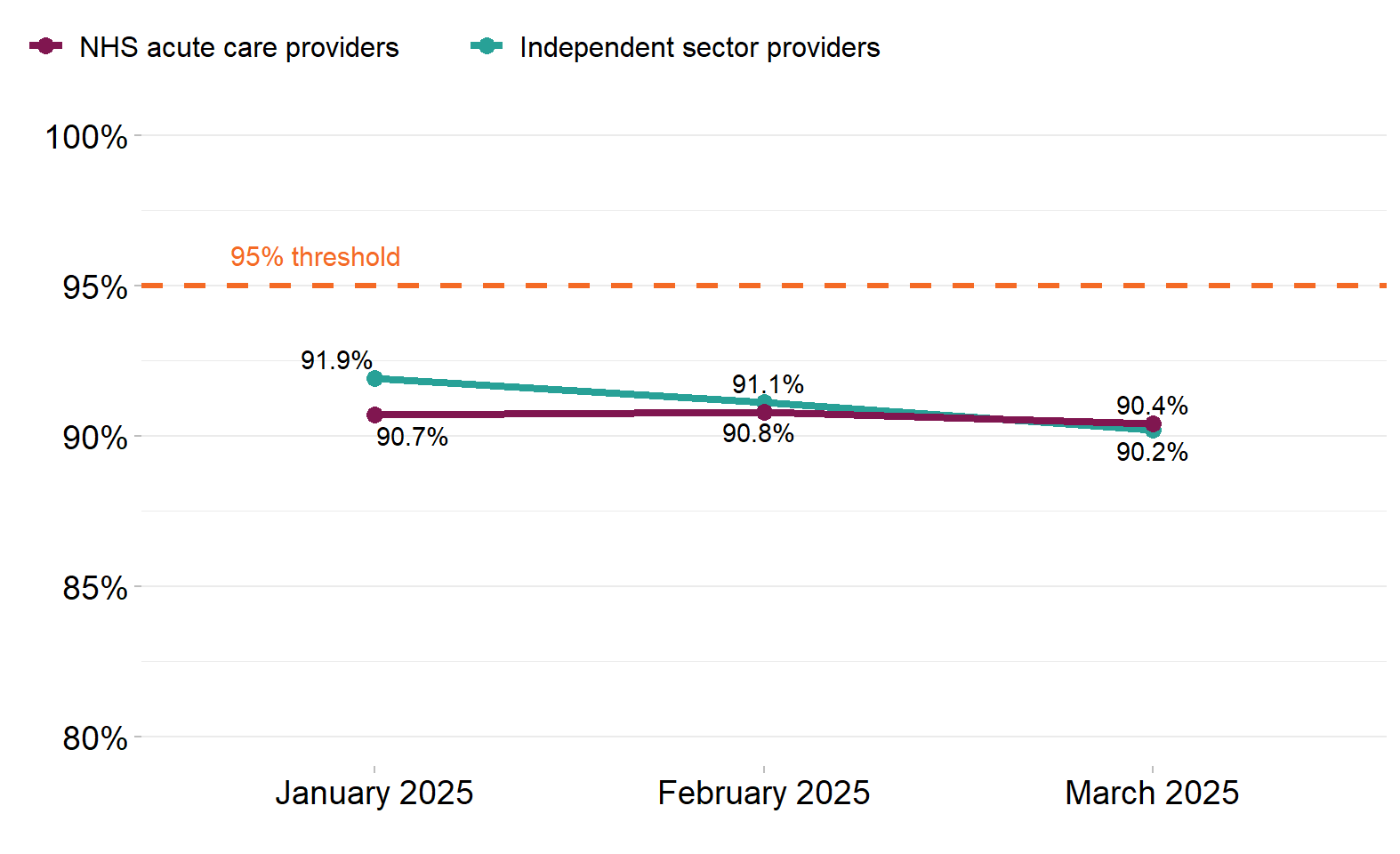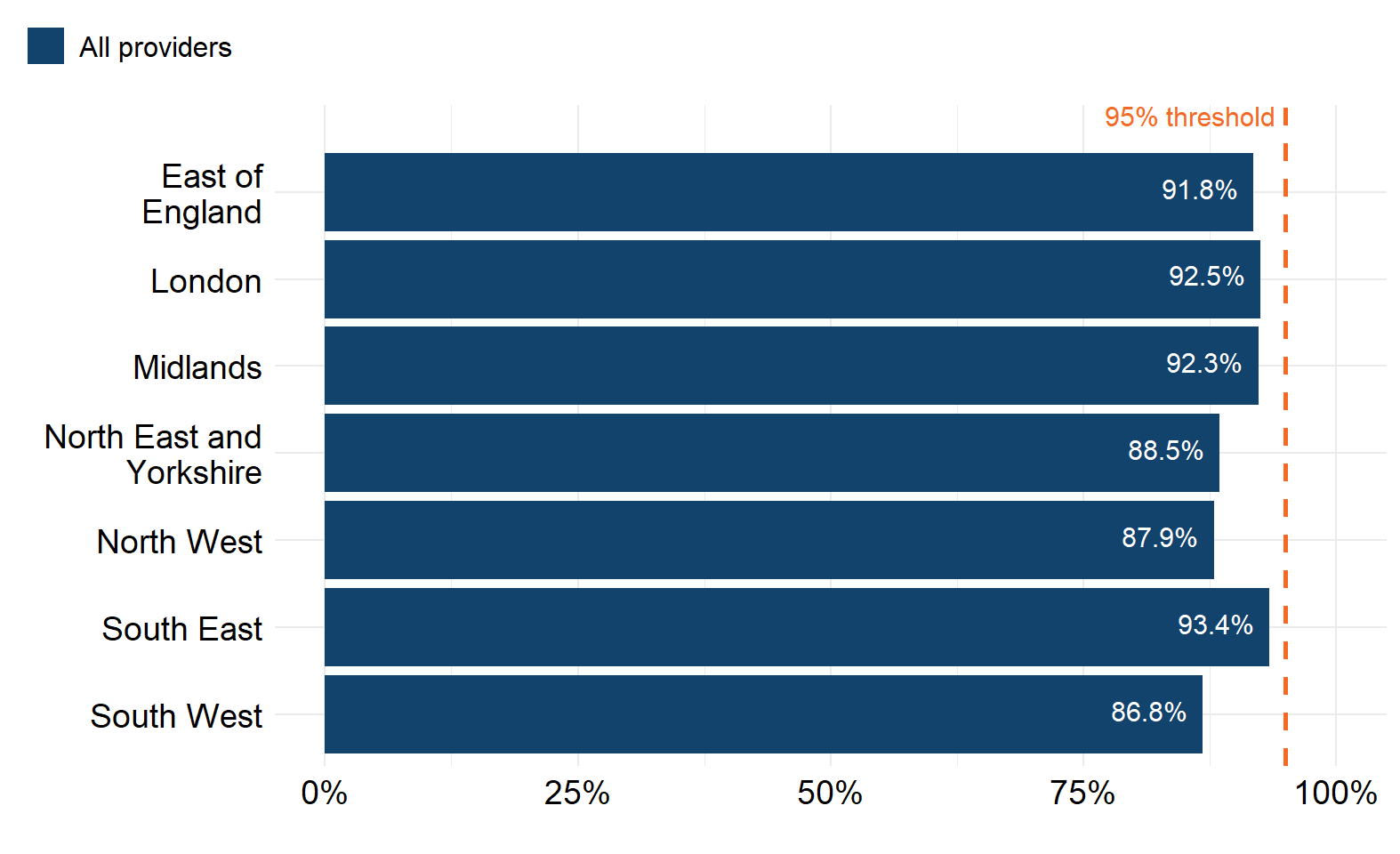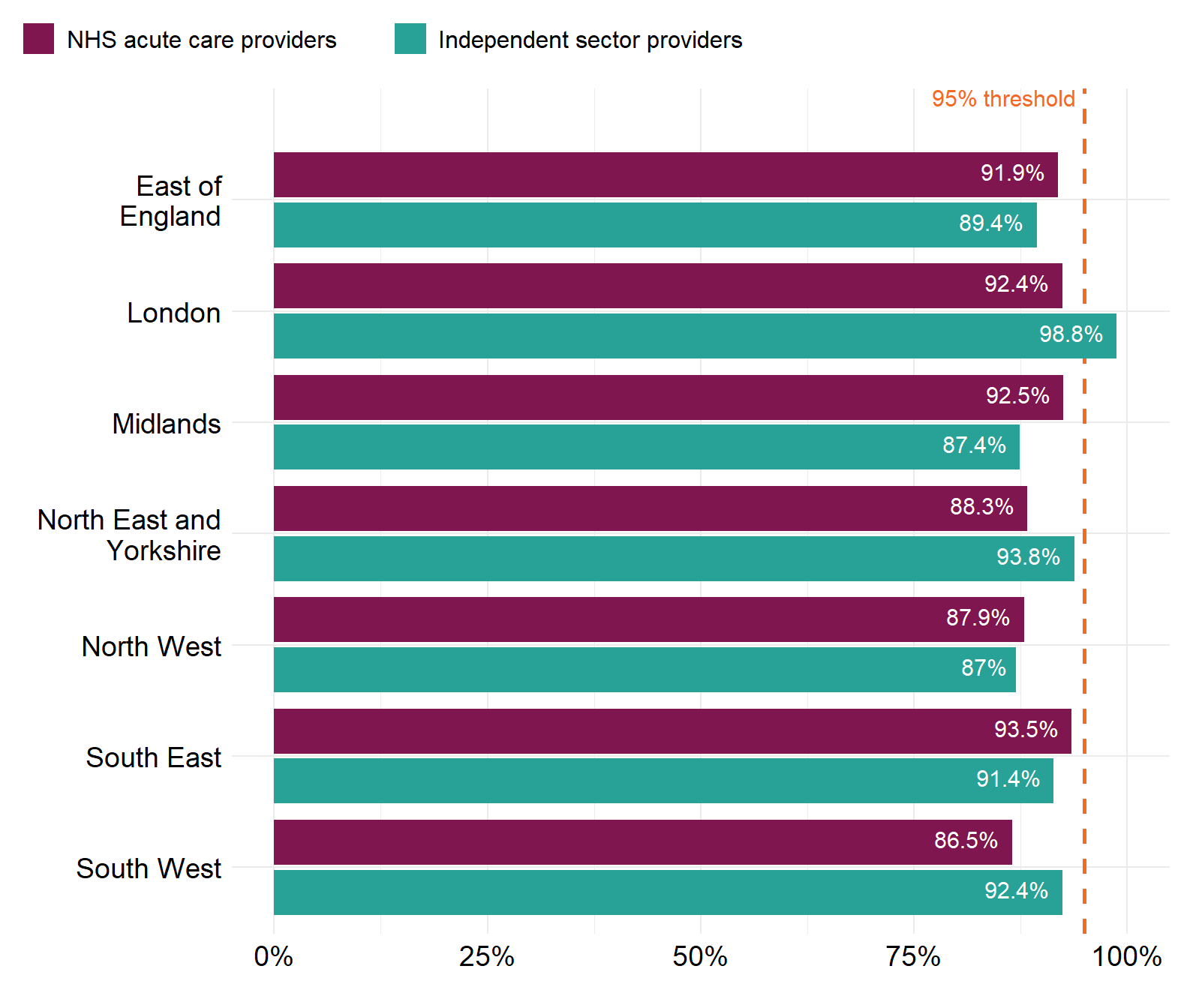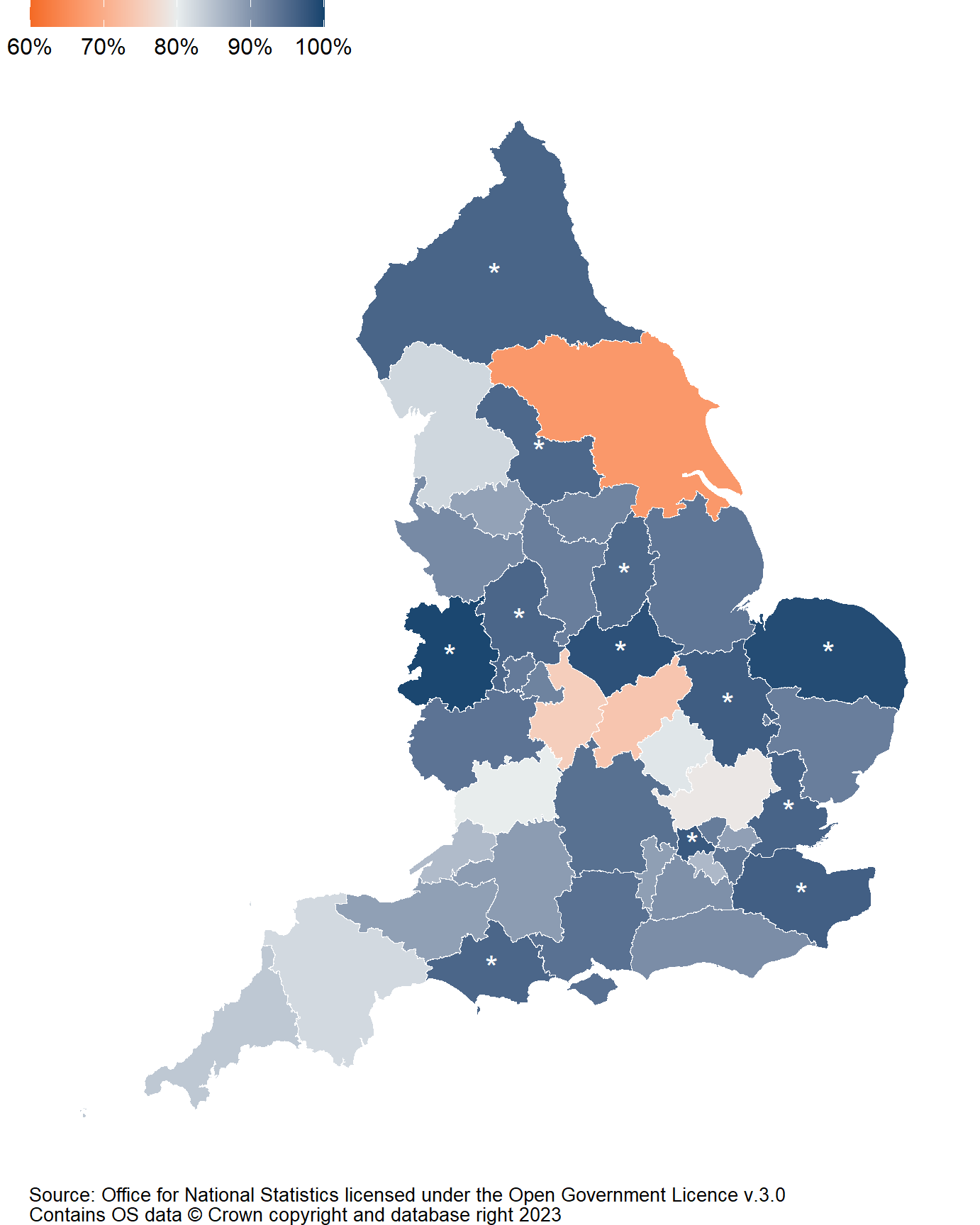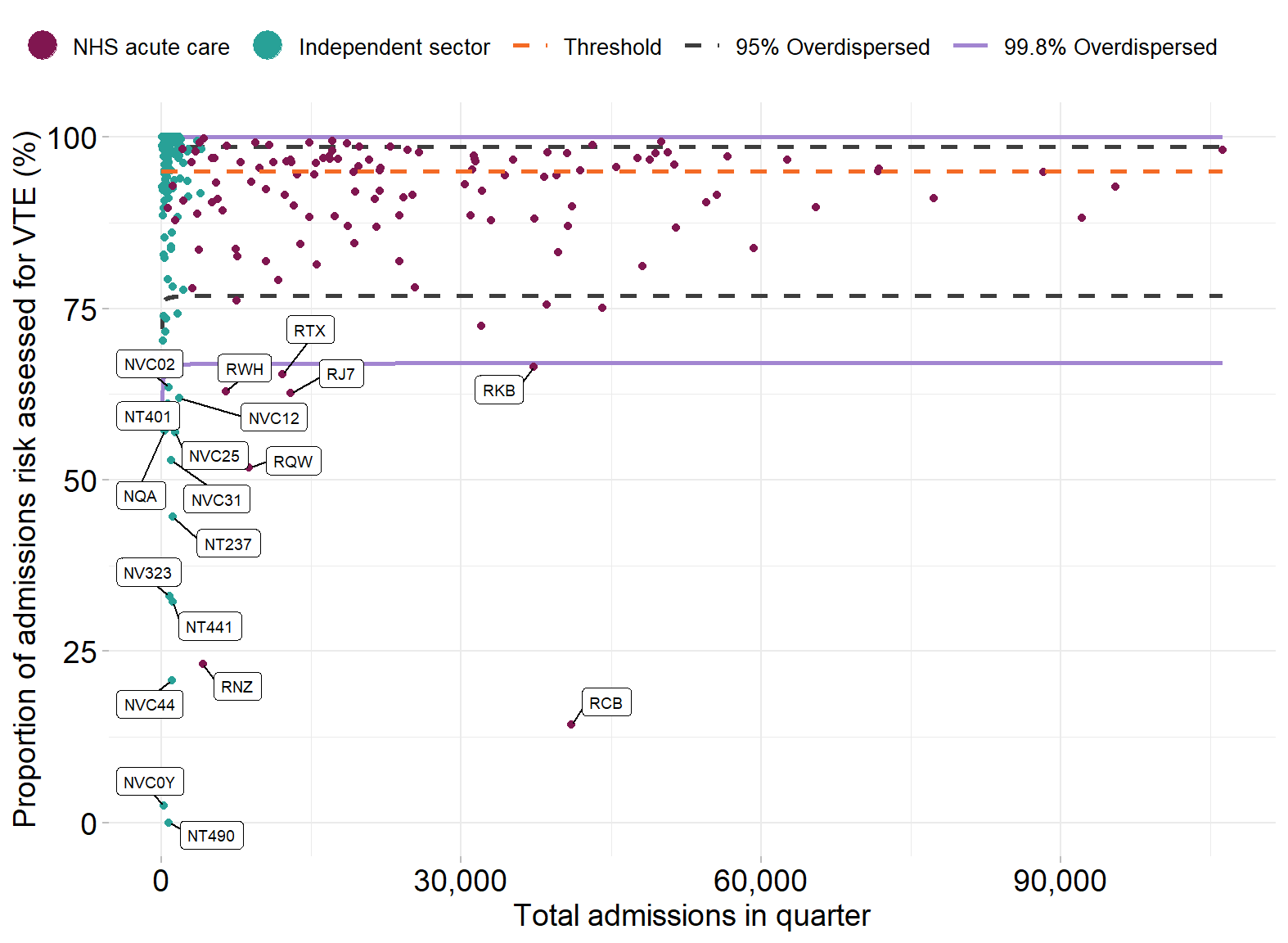Quarter 4 2024/25 (January to March 2025)
1 Background
Healthcare associated venous thromboembolism (VTE), commonly known as blood clots, is a significant international patient safety issue. The first step in preventing death and disability from VTE is to identify those at risk so that preventative treatments (prophylaxis) can be given. This data collection quantifies the numbers of hospital admissions (aged 16 and over at the time of admission) who are being risk assessed for VTE to identify those who should be given appropriate prophylaxis based on guidance from the National Institute for Health and Care Excellence (NICE). Such measures have the potential to save many lives each year.
This data collection is intended to embed VTE risk assessment across the NHS and will be critical in evaluating the impact of the National VTE Prevention Programme on improving health outcomes for patients. The VTE risk assessment is a former national CQUIN indicator and is a National Quality Requirement in the NHS Standard Contract for 2024/25. It sets an operational standard of 95% of patients aged 16 and over being risk assessed for VTE on admission each month. Prior to April 2019 the operational standard related to adult patients aged 18 and over.
The data collection asks for the following information:
- number of admitted patients (aged 16 and over at the time of admission) in the month who have been risk assessed for VTE within 14 hours of admission to hospital using the criteria in the NICE guidance.
- total number of admitted patients (aged 16 and over at the time of admission) in the month.
The percentage of admitted patients (aged 16 and over at the time of admission) in the month who have been risk assessed for VTE on admission is automatically calculated from items (1) and (2).
All providers of NHS-funded acute care (that is, NHS trusts and foundation trusts and independent sector providers of acute NHS services) must complete this data collection. Providers of non-acute health services only are not asked to complete this data collection, although they should be aware that all patients should be protected from unnecessary risk of VTE.
For the purposes of this collection, risk assessment should be completed on admitted patients within 14 hours of admission; NICE guidelines state that where required, pharmacological thromboprophylaxis should be started within 14 hours of admission, therefore risk assessment should be completed prior to this, unless otherwise stated in the population-specific recommendations.
This data collection is a census of all patients – it is not appropriate to use sampling methodologies to produce estimates.
2 Download data
Note the date of each month of collection is given as the first of the month in the CSV file.
3 Summary of the data collection
The key results for the data collected on the number and percentage of VTE risk assessments on admitted patients aged 16 and over to NHS-funded acute care (NHS trusts, NHS foundation trusts and independent sector providers) in quarter 4 (Q4) 2024/25 (January to March 2025) are:
- the percentage of admitted patients risk assessed for VTE in England was 91%. Of the 3.4 million admitted patients for whom data was reported in this collection, 3.1 million were risk assessed for VTE on admission.
- the percentage of admitted patients risk assessed for VTE was 91% for NHS acute care providers and 91% for independent sector providers. NHS acute care providers carry out 96% of all VTE risk assessments.
- the percentage of admitted patients risk assessed for VTE for each region was: East of England 92%, London 93%, Midlands 92%, North East and Yorkshire 88%, North West 88%, South East 93% and South West 87%.
- 29% of integrated care boards (ICBs) (12 of the 42 ICBs) carried out a VTE risk assessment for 95% or more of their admissions (the NHS Standard Contract operational standard).
4 Findings
4.1 Percentage of total admissions risk assessed for VTE in England
In Q4 2024/25 all providers of NHS-funded acute care (NHS trusts, foundation trusts and independent sector providers) reported 3.4 million eligible admissions. Of these, 3.1 million (91%) received a VTE risk assessment on admission. Comparison to previous collection figures can be seen in Figure 2.
Figure 1: Percentage of hospital admissions (aged 16 and over at the time of admission) risk assessed for VTE in England by month (Q4 2024/25)
Table 1: Percentage of hospital admissions (aged 16 and over at the time of admission) risk assessed for VTE in England by month (Q4 2024/25)
| January 2025 | February 2025 | March 2025 | |
|---|---|---|---|
| All providers of NHS-funded acute care | 90.7% | 90.8% | 90.4% |
Figure 2: Percentage of hospital admissions (aged 16 and over at the time of admission) risk assessed for VTE in previous collections
Table 2: The 5 NHS acute care providers with the highest percentage of admitted patients being risk assessed (Q4 2024/25)
| Code | Provider | Risk assessed for VTE | Total admissions | Percentage risk assessed for VTE |
|---|---|---|---|---|
| RL1 | The Robert Jones and Agnes Hunt Orthopaedic Hospital NHS Foundation Trust | 4,188 | 4,198 | 99.8% |
| RFF | Barnsley Hospital NHS Foundation Trust | 16,986 | 17,074 | 99.5% |
| RM1 | Norfolk and Norwich University Hospitals NHS Foundation Trust | 49,719 | 50,044 | 99.4% |
| RRJ | The Royal Orthopaedic Hospital NHS Foundation Trust | 3,826 | 3,855 | 99.2% |
| RP6 | Moorfields Eye Hospital NHS Foundation Trust | 9,334 | 9,406 | 99.2% |
Table 3: The 5 NHS acute care providers with the lowest percentage of admitted patients being risk assessed (Q4 2024/25)
| Code | Provider | Risk assessed for VTE | Total admissions | Percentage risk assessed for VTE |
|---|---|---|---|---|
| RCB | York and Scarborough Teaching Hospitals NHS Foundation Trust | 5,858 | 41,043 | 14.3% |
| RNZ | Salisbury NHS Foundation Trust | 958 | 4,137 | 23.2% |
| RQW | The Princess Alexandra Hospital NHS Trust | 4,533 | 8,751 | 51.8% |
| RJ7 | St George’s University Hospitals NHS Foundation Trust | 8,089 | 12,914 | 62.6% |
| RWH | East and North Hertfordshire NHS Trust | 4,040 | 6,428 | 62.9% |
4.2 Percentage of total admissions risk assessed for VTE in England by organisation type
In Q4 2024/25, the percentage of admitted patients (aged 16 and over at the time of admission) receiving a VTE risk assessment was 91% for NHS acute care providers and 91% for independent sector providers. NHS acute care providers carry out 96% of all VTE risk assessments and independent sector providers carry out 4%.
Figure 3: Percentage of hospital admissions (aged 16 and over at the time of admission) risk assessed for VTE in England by organisation type and by month (Q4 2024/25)
Table 4: Percentage of hospital admissions (aged 16 and over at the time of admission) risk assessed for VTE in England by organisation type by month (Q4 2024/25)
| January 2025 | February 2025 | March 2025 | |
|---|---|---|---|
| NHS acute care providers | 90.7% | 90.8% | 90.4% |
| Independent sector providers | 91.9% | 91.1% | 90.2% |
4.3 Percentage of total admissions risk assessed for VTE in England by region
No regions achieved the 95% NHS Standard Contract operational standard in Q4 2024/25.
Figure 4: Percentage of hospital admissions (aged 16 and over at the time of admission) risk assessed for VTE in England by region (Q4 2024/25)
Table 5: Percentage of hospital admissions (aged 16 and over at the time of admission) risk assessed for VTE in England by region (Q4 2024/25)
| NHS region | All providers |
|---|---|
| East of England | 91.8% |
| London | 92.5% |
| Midlands | 92.3% |
| North East and Yorkshire | 88.5% |
| North West | 87.9% |
| South East | 93.4% |
| South West | 86.8% |
4.4 Percentage of total admissions risk assessed for VTE in England by region and organisation type
Figure 5: Percentage of hospital admissions (aged 16 and over at the time of admission) risk assessed for VTE in England by region and organisation type (Q4 2024/25)
Table 6: Percentage of hospital admissions (aged 16 and over at the time of admission) risk assessed for VTE in England by region and organisation type (Q4 2024/25)
| NHS region | NHS acute care providers | Independent sector providers |
|---|---|---|
| East of England | 91.9% | 89.4% |
| London | 92.4% | 98.8% |
| Midlands | 92.5% | 87.4% |
| North East and Yorkshire | 88.3% | 93.8% |
| North West | 87.9% | 87.0% |
| South East | 93.5% | 91.4% |
| South West | 86.5% | 92.4% |
4.5 Percentage of total admissions risk assessed for VTE in England by integrated care board (ICB).
- in Q4 2024/25, 29% of ICBs (12 of the 42 ICBs) carried out a VTE risk assessment for 95% or more of their admissions (the NHS Standard Contract operational standard).
Figure 6: Percentage of hospital admissions (aged 16 and over at the time of admission) risk assessed for VTE in England by integrated care board (ICB) (Q4 2024/25).
* denotes where an ICB has met the 95% threshold.
Table 7: Percentage of hospital admissions (aged 16 and over at the time of admission) risk assessed for VTE in England by integrated care board (ICB) (Q4 2024/25)
| ICB name | Percentage | 95% threshold |
|---|---|---|
| NHS Shropshire, Telford and Wrekin ICB | 99.5% | Threshold met |
| NHS Norfolk and Waveney ICB | 98.8% | Threshold met |
| NHS Leicester, Leicestershire and Rutland ICB | 98.1% | Threshold met |
| NHS North West London ICB | 97.1% | Threshold met |
| NHS Cambridgeshire and Peterborough ICB | 96.6% | Threshold met |
| NHS Kent and Medway ICB | 96.3% | Threshold met |
| NHS Mid and South Essex ICB | 95.7% | Threshold met |
| NHS North East and North Cumbria ICB | 95.6% | Threshold met |
| NHS Staffordshire and Stoke-On-Trent ICB | 95.4% | Threshold met |
| NHS Dorset ICB | 95.4% | Threshold met |
| NHS West Yorkshire ICB | 95.2% | Threshold met |
| NHS Nottingham and Nottinghamshire ICB | 95.1% | Threshold met |
| NHS Buckinghamshire, Oxfordshire and Berkshire West ICB | 94.1% | Threshold not met |
| NHS Hampshire and Isle Of Wight ICB | 94.1% | Threshold not met |
| NHS Herefordshire and Worcestershire ICB | 93.8% | Threshold not met |
| NHS Lincolnshire ICB | 93.5% | Threshold not met |
| NHS South East London ICB | 93.3% | Threshold not met |
| NHS Black Country ICB | 93% | Threshold not met |
| NHS North Central London ICB | 92.8% | Threshold not met |
| NHS Derby and Derbyshire ICB | 92.5% | Threshold not met |
| NHS Suffolk and North East Essex ICB | 92.5% | Threshold not met |
| NHS Birmingham and Solihull ICB | 91.9% | Threshold not met |
| NHS South Yorkshire ICB | 91.8% | Threshold not met |
| NHS Cheshire and Merseyside ICB | 91.1% | Threshold not met |
| NHS Sussex ICB | 90.7% | Threshold not met |
| NHS Surrey Heartlands ICB | 90.4% | Threshold not met |
| NHS Bath and North East Somerset, Swindon and Wiltshire ICB | 89% | Threshold not met |
| NHS Frimley ICB | 88.7% | Threshold not met |
| NHS North East London ICB | 88.6% | Threshold not met |
| NHS Somerset ICB | 88.6% | Threshold not met |
| NHS Greater Manchester ICB | 88.3% | Threshold not met |
| NHS South West London ICB | 85.7% | Threshold not met |
| NHS Bristol, North Somerset and South Gloucestershire ICB | 85.4% | Threshold not met |
| NHS Cornwall and The Isles Of Scilly ICB | 84% | Threshold not met |
| NHS Lancashire and South Cumbria ICB | 82.4% | Threshold not met |
| NHS Devon ICB | 82.1% | Threshold not met |
| NHS Bedfordshire, Luton and Milton Keynes ICB | 80.7% | Threshold not met |
| NHS Gloucestershire ICB | 79.9% | Threshold not met |
| NHS Hertfordshire and West Essex ICB | 79.1% | Threshold not met |
| NHS Coventry and Warwickshire ICB | 75.2% | Threshold not met |
| NHS Northamptonshire ICB | 73.8% | Threshold not met |
| NHS Humber and North Yorkshire ICB | 66.8% | Threshold not met |
4.6 Percentage of total admissions risk assessed for VTE in England by total admissions
Figure 7 is a funnel plot of the total admissions for each provider in the quarter against the percentage of total admissions risk assessed for VTE. The funnel plot limits have been adjusted for overdispersion. Providers that fall outside of the 99.8% overdispersed limit have been labelled.
Figure 7: Percentage of total admissions risk assessed for VTE in England by total admissions for provider in quarter (Q4 2024/25).
4.7 Number of valid data returns
- the total number of valid data returns submitted by all providers of NHS-funded acute care in each month of Quarter 4 2024/25 (January to March 2025) was 274.
- the number of valid NHS acute care providers submitting a data return in each month of Quarter 4 2024/25 (January to March 2025) was 123.
- for independent sector providers, it was 151 in each month of Quarter 4 2024/25 (January to March 2025).
5 Data quality
5.1 General
- The data collection is mandatory and risk assessments should be completed on admitted patients within 14 hours of admission. It is a requirement to report on admitted patients aged 16 and over and providers are required to submit information based on a census of patients. The following are excluded from the data:
- providers that submit data with risk assessments completed after 14 hours of admission.
- providers that use different age criteria.
- providers that submit data based on a sample or audit of patients.
- providers that did not have any admissions in a particular month.
- children’s hospitals: Alder Hey Children’s NHS foundation trust (RBS), Great Ormond Street Hospital for Children NHS foundation trust (RP4) and Sheffield Children’s NHS foundation trust (RCU).
- Work is ongoing to improve data coverage and completeness and any additional data points will be added retrospectively as appropriate.
5.2 Organisation changes
- North Middlesex University NHS Trust (RAP) merged with Royal Free London NHS Foundation Trust (RAL) on 1st January 2025. They no longer submit as a separate trust under RAP and their submissions are now under RAL.
5.3 Non-acute NHS trusts
The following non-acute NHS trusts are not in included in the figures:
- Hampshire and Isle of Wight Healthcare NHS Foundation Trust (RW1) is a community trust that submitted to this collection. Their reporting process re-established from January 21st 2025 which means January is a partial month. The percentage of admitted patients risk-assessed for VTE for this partial data was 96%.
5.4 Sample, audit or partially submitted data
The following providers that submit data based on sample or audit of patients are not included in the figures:
- Kettering General Hospital NHS Foundation Trust (RNQ) VTE risk assessment process is currently paper based so is submitting data based on a sample of patients. The sample percentage of admitted patients risk-assessed for VTE was 79%. The provider is working towards providing data for all patients admitted once their process is digital.
- Northampton General Hospital NHS Trust (RNS) submission is calculated from a VTE sample audit. The sample percentage of admitted patients risk-assessed for VTE was 83%. The provider is working towards providing data for all patients admitted once they have implemented an EPMA system later this year.
- East Suffolk and North Essex NHS Foundation Trust (RDE) VTE risk assessment process is currently paper based so is unable to provide risk assessed admission data on all their admissions. The provider is working towards providing data for all patients admitted once they have implemented a new EPR in October 2025.
- Royal Berkshire NHS Foundation Trust (RHW) reported problems with data collection this quarter and are only reporting on a proportion of our patients. They are missing 50% of data for the full month of February and the first few days of March. The percentage of admitted patients risk-assessed for VTE for this partial data was 95%.
5.5 Providers preparing to submit
The following providers are in the process of preparing to submit:
- Northern Care Alliance NHS Foundation Trust (RM3) are aiming to submit in June 2025.
- North Cumbria Integrated Care NHS Foundation Trust (RNN) are working towards providing data for all patients admitted once they have implemented a new EPR in early 2026.
- The Shrewsbury and Telford Hospital NHS Trust (RXW) are aiming to submit in June 2025.
- The McIndoe Centre (NXM04). Date to be confirmed.
- The following Nuffield Health Hospitals VTE risk assessment process is currently paper based. These hospitals will begin submitting in Q2 2025/26 once they have implemented an EPR system later this year:
- Nuffield Health The Holly Hospital (H4I8B)
- Nuffield Health, Cheltenham Hospital (NT211)
- Nuffield Health, Guildford Hospital (NT216)
- Nuffield Health, Hereford Hospital (NT219)
- Nuffield Health, Ipswich Hospital (NT222)
- Nuffield Health, Warwickshire Hospital (NT224)
- Nuffield Health, Leeds Hospital (NT225)
- Nuffield Health, Woking Hospital (NT241)
- Nuffield Hospital Oxford (The Manor) (NT244)
- Nuffield Health Parkside Hospital (R0F4N)
5.6 Zero admissions
- Edgbaston Hospital (NT445) submitted zero admissions for each month in the submitting period.
5.7 No submissions received
The following providers did not submit data for this publication:
- Sandwell And West Birmingham Hospitals NHS Trust (RXK).
- Manor Hospital (NT423).
- The New Foscote Hospital Ltd (DX1).
5.8 Quality assurance
Data quality assurance focuses on identifying missing data, data errors (for example the numerator should not be greater than the denominator) and data consistency over time. Any issues identified are discussed with providers and they are given the opportunity to clarify or resubmit their data within the quality assurance period.
6 Timings and publication
Providers must collect data and submit it to the Strategic Data Collection Service run by NHS England. The deadline is the last working day of the month following the quarter end.
Data are submitted and published according to the timings below:
| Timing | Process |
|---|---|
| Month A (for example June) | Data are collected from patients in each provider for the quarter |
| Month B (for example July) | Providers submit their data quarterly for the previous quarter with a deadline of the last working day of the month following the end of that quarter (for example Q1 data is submitted towards the end of July) |
| Month C (for example August) | Data is quality assured |
| Month D (for example September) | Data for the quarter is published on the NHS England website at the beginning of month D (for example Q1 data in early September) |
7 Guidance
Guidance on the data collection is given in the 2024/25 NHS Standard Contract and can be found at: https://www.england.nhs.uk/publication/nhs-standard-contract-2024-25-technical-guidance/
8 Additional information
Please email press enquiries to NHS England Press Office at: nhsengland.media@nhs.net or call 0113 825 0958.
Your feedback is welcomed on the format, frequency and utility of this document, so that we can provide reports that are of most benefit, Please contact patientsafety.analysis@nhs.net with any suggestions.
The analysts with overall responsibility for this report are:
Joshua Mutio
Lead Analyst
Patient Safety, Medical Directorate Programmes
Data & Analytics
NHS England
David Hardy
Senior Analyst
Patient Safety, Medical Directorate Programmes
Data & Analytics
NHS England

